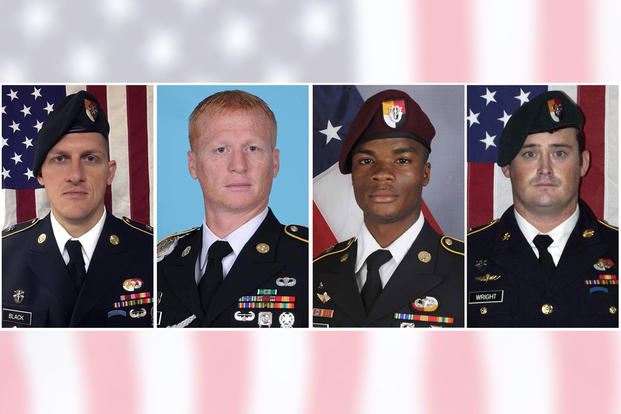Defense Secretary Jim Mattis said Sunday the investigation into the Niger ambush that killed four U.S. troops will involve the broader context of the U.S. mission and how it fits with overall French operations south of the Sahara.
"It is extensive; it is thousands of pages long," Mattis said of the Article 15-6 fact-finding investigation of the Oct. 4 ambush near the village of Tongo Tongo in northwestern Niger, near the Mali border.
"It is looking at all aspects, not just to this specific incident but to the broader circumstances surrounding that incident, so you get a holistic view," he told reporters traveling with him on a weeklong trip to Europe. Mattis on Sunday began a trip to Rome, Brussels, Stuttgart and Munich for a series of meetings with his European counterparts and NATO officials.
France has several thousand troops in Mali to combat extremism in the region by groups linked to al-Qaida and the Islamic State of Iraq and Syria. French air assets based in Mali responded to the ambush in Niger.
Matts said French operations in the Sahel were "brilliantly led, that's the only way to describe it."
He said the investigation report is "making its way to me," and he expects to see the full version in a "week or two."
In the aftermath of the ambush, Joint Chiefs Chairman Gen. Joseph Dunford said last October that a classified version of the report will delivered to Congress.
A second version of the report will go to the families of the four troops who were killed; an unclassified version will be released to the public. There is no timetable for the public release.
In Europe this week, Mattis will meet on Thursday or Friday with Marine Gen. Thomas Waldhauser, commander of U.S. Africa Command, at his headquarters in Stuttgart, Germany, to be briefed on the report, which reportedly calls for major changes in the way U.S. troops partner with local forces in Niger.
Four Nigerien troops and an interpreter also were killed in the ambush.
The four U.S. troops who were killed were part of a 12-man team from the Army's 3rd Special Forces Group that joined a patrol with about 30 Nigerien troops in an advisory capacity, according to AfriCom.
In addition to the Article 15-6 investigation, the FBI is also looking into the implications for national security of the ambush that killed Sgt. La David Johnson, 25, of Miami Gardens, Florida; Staff Sgt. Bryan C. Black, 35, of Puyallup, Washington; Staff Sgt. Jeremiah W. Johnson, 39, of Springboro, Ohio; and Staff Sgt. Dustin M. Wright, 29, of Lyons, Georgia.
A key aspect of the investigation is expected to focus on the circumstances of the death of Sgt. La David Johnson, whose body was not recovered until two days after the initial firefight.
The Article 15-6 investigation of the Niger ambush is being led by Army Maj. Gen. Roger Cloutier, Waldhauser's chief of staff.
Over the weekend, The New York Times reported that a draft of the Article 15-6 investigation recommended that the U.S. scale back joint patrols in Niger and also limit the authority of field commanders to order up missions.
Such a move would be in contrast to U.S. interactions with partnered forces in other conflict regions, where the Trump administration and Mattis have granted wide latitude to field commanders in how troops operate.
Citing military officials who spoke on grounds of anonymity, The New York Times report said that more senior commanders in Africa, Stuttgart and possibly the Pentagon would have to approve missions in Niger that are considered risky.
-- Richard Sisk can be reached at Richard.Sisk@Military.com.













